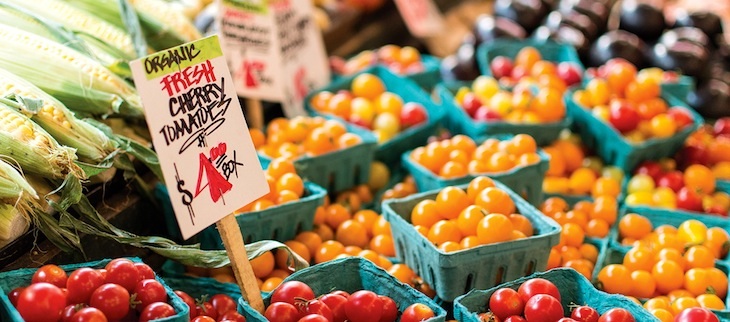Despite the spring chill, summer farmers markets make ready
by April 20, 2018 3:03 pm 557 views

Freezing temperatures in April were not kind to budding pear, peach and nectarine trees. But local farmers say their strawberry crops look healthy, and Lad Hiatt of Hiatt Blueberry Farm still hopes to debut a robust blueberry crop at farmers markets on Memorial Day weekend.
“It’s a good crop, even with the recent cold snaps. Most of our bushes hadn’t bloomed yet,” said Hiatt, who sells on Saturdays at markets in downtown Bentonville and Rogers and mid-week outside Dixieland Mall in Rogers.
Farmers markets across Northwest Arkansas are launching their spring/summer seasons. The number of shoppers continues to rise each year, managers say, although weather is always the primary determinant for turnout.
Fayetteville led the advance on Easter weekend and Siloam Springs on April 14. Bentonville will follow on April 21, Rogers on April 28, downtown Springdale on May 3, and downtown markets in both Springdale and Rogers open May 5. The earliest produce will include lettuces and other greens, peas, asparagus and strawberries.
Employees of the larger markets are personally inspecting the growing practices on vendor farms, and many use a jury process to select crafts and prepared products. Most markets require items to be grown, prepared and/or made in the immediate region, and nothing can be bought and resold.
The Rogers Farmers Market at Dixieland Mall is one exception; for instance, it allows the sale of fresh seafood purchased in Texas, but a proper USDA permit was verified. That market does not require inspection or jury, as is true with most smaller markets in the region. Such practices ensure the quality and diversity of products at markets in Benton and Washington counties are better than ever, market managers say.
These markets serve as a farmer incubator, and an equalizer for small farmers who can’t compete with longer growing seasons and larger operations, said Mark Cain of Dripping Springs Garden in Carroll County, a vendor at the Fayetteville Farmers Market since 1989 and member of its governing board.
“Small vegetable producers don’t even make as much money as tradespeople, such as carpenters,” Cain said. “New and small farmers have erratic supplies because of weather and succession planting. At a farmers market, they can get started or sell on a small scale, because they don’t have to provide a particular mix or amount.”
Cain and his partner, Michael Crane, tend a certified organic farm alongside Dry Fork Creek, outside Huntsville, and increasingly look to incorporate lean principles. They rely on the Fayetteville market for 75% of overall sales: 60% of sales are from flowers and the rest organic produce.
“Our job is to take the best of what we have, display it awesomely and sell as much as we can in a way that makes everyone happy. Everyone wants a happy farmer,” Cain said. “Amazingly, it all works. Easter weekend we had so much loaded up, I thought, how are we going to sell all this? We had wave after wave of people coming, and we sold it all. Then last weekend was the opposite. It snowed on us, and it was 25 degrees.”
Intangible rewards arise from farmer and customer interactions.
“Not only are they asking me questions about the produce and how to use it or when the mushrooms are coming in,” Cain said. “We’ll learn that they’re getting engaged, or it’s their grandmother’s birthday, or someone passed away and they need so many Black-eyed Susans. That was the person’s favorite flower.”
The limitation of products by season creates a fortifying rhythm, Cain said.
“We have to wait until late June for tomatoes. There’s a certain grounding within that. The person selling is the one who grew it and can tell you about the variety, when it was planted, what they do about insects.
“It’s an incredible sharing of rural and urban cultures,” he said. “Psychologically, it’s important for people to see the wholesomeness. There’s so much bad news all the time. It gives us a chance to really enjoy where we live.”
Agriculture in Arkansas employs one of every six citizens and contributes more than $20 billion to the state economy. Yet it’s not possible to calculate how much of that is exchanged by farmers markets.
“There’s no method in place to gauge the economic contribution of farmers markets in our state,” said Adriane Barnes, director of communications for the Arkansas Agriculture Department. “It’s been a problem to measure this, as many markets are not organized together. People are trying to [figure it out].”
In Arkansas, sales tax is exempted for produce, flowers and plants sold at farmers markets. The markets themselves subsist largely on sponsorships, moderate vendor fees and commissions averaging 5% to 7% of sales. Leann Halsey, business and program coordinator at the Fayetteville market, said she does not release sales figures, as they are proprietary to the farmers.
